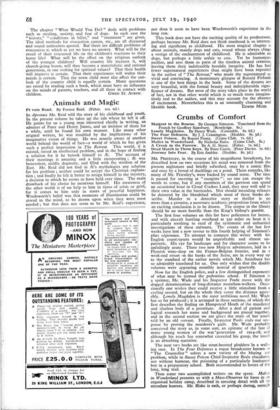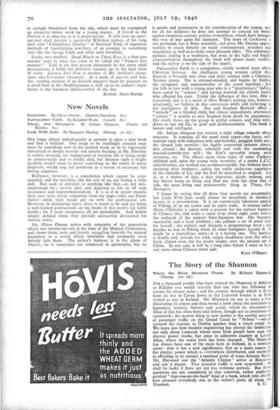Crumbs of Comfort
MR. PRIESTLEY, in the course of his magnificent broadcasts., has described how on two occasions his mind was removed from the
present nightmare and briefly refreshed, once by a comic film and once by a brood of ducklings on a pond. These remarks, like many of Mr. Priestley's, were backed by sound sense. The time is passed for sneering at " escapists " : no one can escape the wrath to come, but if any members of the garrison can spend an occasional Wour in Cloud C'ickoo Land, they may well add to their own value at the barricades. Nor should intending relaxers be deterred by the bloodshed which most of these books de- scribe. Murder to a detective story or thriller is no more than a premise, a necessary academic proposition from which an exciting conclusion is to be drawn. The corpse in the library should be no more horrific than the King's bishop's gambit.
The first four volumes on this list have policemen for heroes, and with aircraft hurtling overhead at 35o miles an hour it is particularly soothing to read of the systematic and unhurried investigations of these stalwarts. The events of the last few weeks have lent a new savour to this fourth helping of Simenon's plats regionaux. To attempt to compare this writer with his English counterparts would be unprofitable and almost un- patriotic. His eye for landscape and for character seems to be unfailingly acute. These two new Maigret adventures, laid in a Flemish wine-shop on the Franco-Belgian frontier, and in a week-end resort on the banks of the Seine, are in every way up to the standard of the earlier novels which Mr. Sainsbury has so admirably translated for us. One only wishes that the double volumes were appearing monthly instead of quarterly.
Now for the English, police, and a few distinguished exponents of what may be termed the pedestrian school. If Simenon is a sprinter, Mr. Wade and his Inspector Poole move with the dogged determination of long-distance marathon-walkers. Occa- sionally one wishes they could receive a little stimulant from a cycling second, but on the whole they cover the distance agree- ably. Lonely Magdalen is the most ambitious novel Mr. Wade has so far produced • it is arranged in three sections, of which the first describes the finding on Hampstead Heath of the murdered and clueless body of a prostitute. After a deal of patient and logical research her name and background are pieced together, and in the second section we are given the story of her youth told by an old servant. Finally, Inspector Poole ends our sus- pense by proving the murderer's guilt. Mr. Wade probably conceived the story as, in some sort, an epitome of the fate of many young women of the war' generation of 1914-18; and although his reach has somewhat exceeded his grasp, the 'result is an absorbing narrative.
The next two books are like stout-hearted plodders 'm a walk- ing race. In The Four Defences a rogue broadcaster known as "The Counsellor" solves a new variety of the blazing• car problem, while in Sweet Poison Chief-Inspector Beale elucidates, not without humour, the poisoning of a particularly loathsome boy in a preparatory school. Both recommended to lovera of the long,, long trail.
Then come two accomplished writers on the spree. Malice in Wonderland presents us with a Mass-Observer let loose in an organised holiday camp, described in amusing detail with all its attendant horrors. Mr. Blake is rash, or perhaps daring, enough
to exclude bloodshed from the tale, which must be considered an attractive minor work by a young master. A Crook in the Furrow is as amusing as it is preposterous. It tells how an inter- national thief became a successful Wiltshire fanner, of his long duel with " Coincidence Charles " of Scotland Yard, of ingenious methods of transhipping jewellery, of an evening in something very like the Savage Club, and other such frivolities.
Lastly, two thrillers. Dead March in Three Keys is a first-rate murder story in what has come to be called the " Francis Iles manner." Told in the first person alternately by the three chief protagonists, it holds the attention securely up to the final twist of irony. Journey Into Fear is another of Mr. Ambler's excur- sions into Levantine chicanery. As a study of pursuit and fear, this exciting account of an English engineer beset by gunmen on a small boat in the Mediterranean is well up to its author's repu- tation as the foremost thriller-writer of the day.
RUPERT HART-DAVIS.



































 Previous page
Previous page